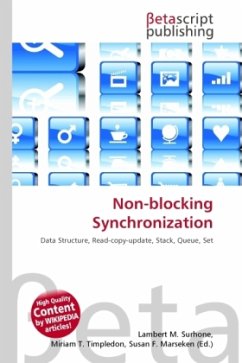
Non-blocking Synchronization
Versandkostenfrei!
Versandfertig in 6-10 Tagen
19,99 €
inkl. MwSt.

PAYBACK Punkte
10 °P sammeln!
High Quality Content by WIKIPEDIA articles! In computer science, non-blocking synchronization ensures that threads competing for a shared resource do not have their execution indefinitely postponed by mutual exclusion. A non-blocking algorithm is lock-free if there is guaranteed system-wide progress; wait-free if there is also guaranteed per-thread progress. Literature up to the turn of the 21st century used "non-blocking" synonymously with lock-free. However, since 2003,[1] the term has been weakened to only prevent progress-blocking interactions with a preemptive scheduler. In modern usage, ...
High Quality Content by WIKIPEDIA articles! In computer science, non-blocking synchronization ensures that threads competing for a shared resource do not have their execution indefinitely postponed by mutual exclusion. A non-blocking algorithm is lock-free if there is guaranteed system-wide progress; wait-free if there is also guaranteed per-thread progress. Literature up to the turn of the 21st century used "non-blocking" synonymously with lock-free. However, since 2003,[1] the term has been weakened to only prevent progress-blocking interactions with a preemptive scheduler. In modern usage, therefore, an algorithm is non-blocking if the suspension of one or more threads will not stop the potential progress of the remaining threads. They are designed to avoid requiring a critical section. Often, these algorithms allow multiple processes to make progress on a problem without ever blocking each other. For some operations, these algorithms provide an alternative to locking mechanisms.












